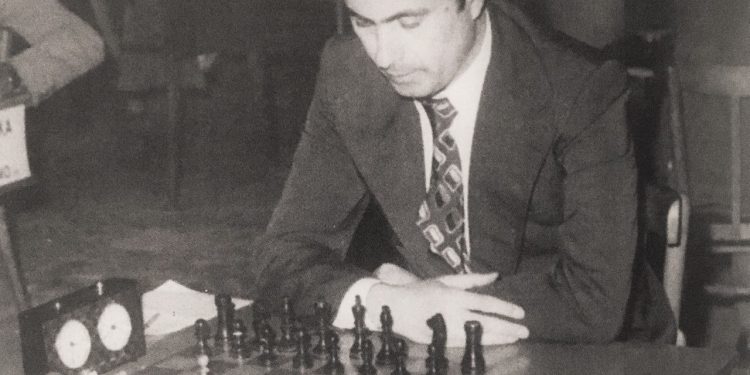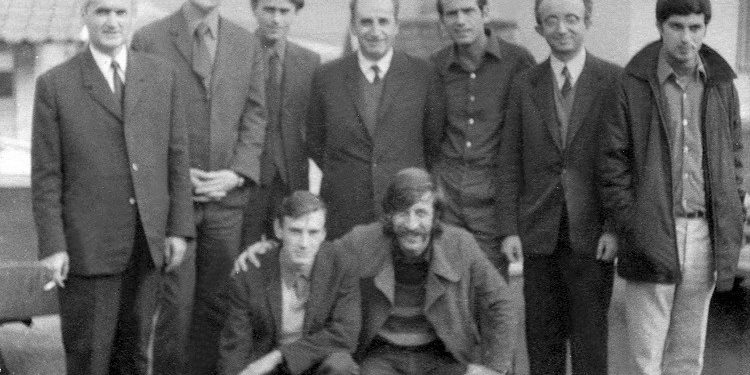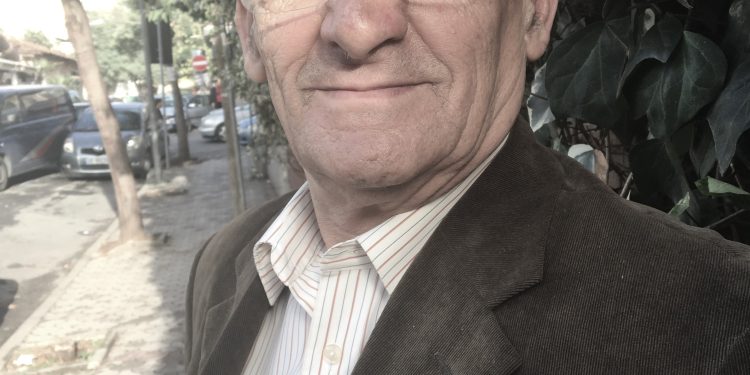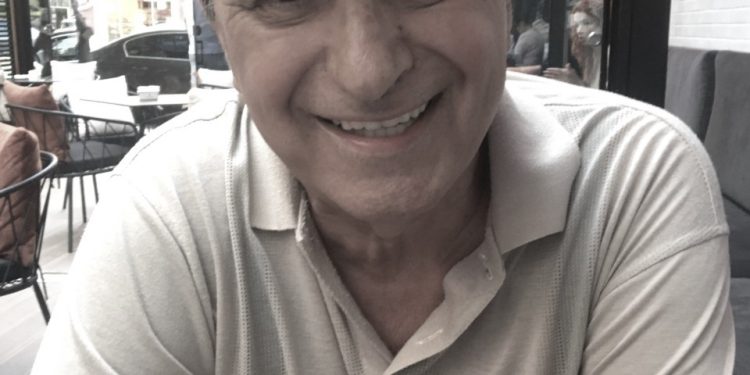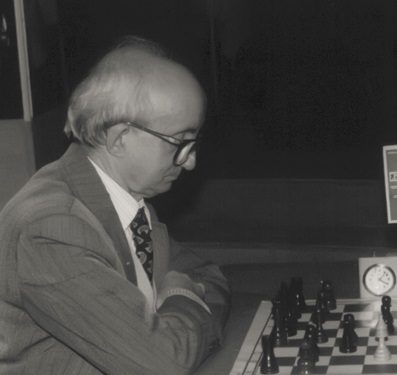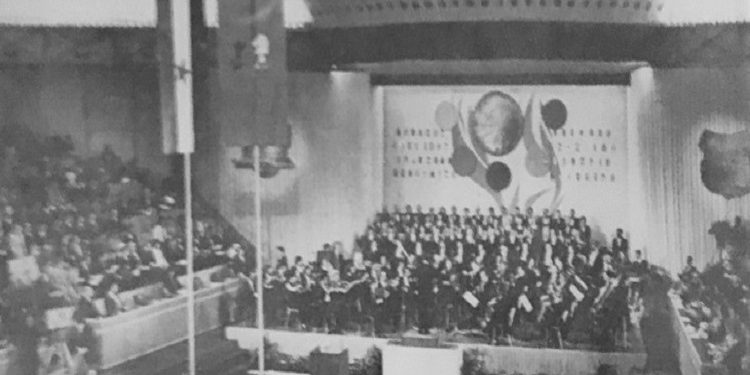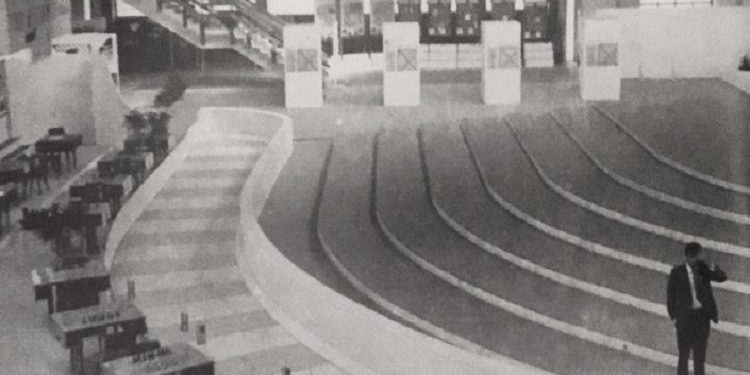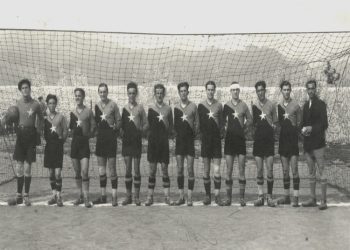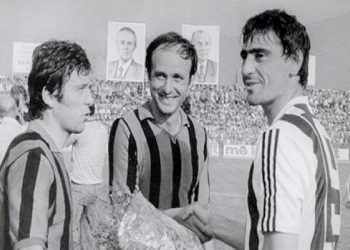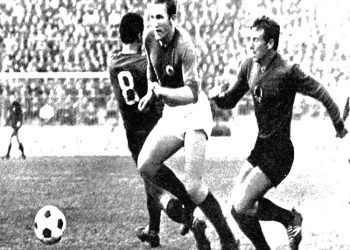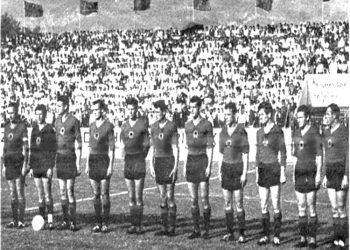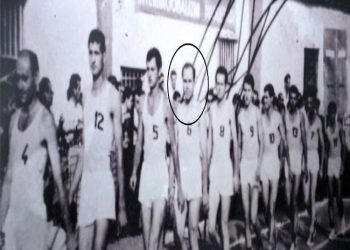FROM UVIL ZAJMI
The first part
Memorie.al / Skopje 1972. More than 50 years have passed since that Olympics. Considered the biggest event, not only for the history of chess, but also for Albanian sports, that tournament started with promising results and a dignified representation, but it was abandoned by the Albanian team with a bang, which had never happened before nor later, shaking the world environment of quadrats, but not only. From the long build-up, the preparation, the start on September 19, the enthusiasm, the hopes for the best possible performance. After half a century, we are bringing to the readers that event, narrated by the masters of the black and white stones themselves, protagonists in that gigantic and unforgettable event, when for half a point, the final group was not secured – A. From the newspaper “Borba” in “Politika”, what was it like, was it only the refusal to meet with Israel, or was it related to the boycott of the invitation to the reception organized by the head of Yugoslavia at that time, Josif Broz Tito, in Belgrade? In the end, what was the reaction of Tirana in support of Albanian chess players?
ALBANIAN CHESS REPRESENTATION IN THE BALKANIA AND OLYMPIAD
From the book “Albanian chess over the years” by Kristaq Andoni and M. Ibrahim, we are informed that the first international competition was recorded in the Balkan Championship, Belgrade 1946, (August 28-30 of that year), where Albania was presented with: Gaspër Shoshin champion, Bujar Hoxha, Sotir Qirjaku, Skënder Çarçani (team captain), Lefter Doga, Xhafer Çaushi, Qazim Baroni, Ahmet Gashi. Reserves: Hulusi Spahiu, Vangjel Gjikondi. Team leader: Anton Mazreku. Journalist and translator: Veiz Sejko. In conclusion, the last country, after Yugoslavia, Romania and Bulgaria, only 1 point in two draws with Bulgaria.
The second large-scale international competition is the one in Leipzig (German Democratic Republic) 1962, the World Chess Olympiad, the 14th edition, which would also mark a surprise for the time, when Albania is ranked 28th (9 wins, 1 draw, 10 losses), among 40 countries, and the chess players are: Ylvi Pustina, Bujar Hoxha, E. Konçi, Fatos Omari, Mendim Veizaj, tr. Bujar Hoxha, responsible for the V. Gjikondi team. Albania will also be present in Varna (Bulgaria), the World Chess Olympiad of 1962, ranking 26th among 37 countries, with 10 wins, 4 draws and 6 losses. In that tournament, Albania was represented by chess players: Ylvi Pustina, Esat Duraku, E. Konçi, Mendim Veizaj, Teodor Siliqi, Fatos Omari and Nexhmedin Kadiu, team leader.
There is no participation in the World Olympics Tel-Aviv 1964, nor in Havana-1966, Lugano-1968, to return to such a tournament, in the 1970 edition, in Ziegen (Federal Republic of Germany), where Albanian chess players are in the 6th group. But the 0-4 loss, after refusing to play the chess players of the Republic of South Africa, affected the final ranking 38th place out of 60 countries (10 wins, 3 draws and 7 losses).
The protagonists are: Ylvi Pustina, Esat Duraku, Florian Vila, Vangjel Adhami, E. Konçi, Fatos Omari and trainer Prof. Bujar Hoxha. However, Albanian chess is growing; the results and representation show this. Then the World Olympics in Skopje 1972, the long 8-year break, to return to this tournament, precisely in the World Olympics. The Albanians excelled in the Chess Olympiad, but were “burned” for rejecting Israel.
PREPARATION UNDER THE SPIRIT: “ONE FOR ALL AND ALL FOR ONE”
For the World Olympics in Skopje (Yugoslavia), in 1972, the team gathered in Durrës, at the “Vollga” hotel, starting from July 1 of that year. The group consisted of six chess players, according to the best ranking, based on the best results of the last two years, where they are masters, champions, and experienced in such international tournaments: Ylvi Pustina, Vangjel Adhami, Floran Vila and Fatos Omari . As well as the first category chess players, Fatos Muço and Aldo Zadrima debuting in such an event. Coaches are Bujar Hoxha and Zef Ashta.
“The preparation is aimed at increasing the number of openings, finals. Control matches, consultative group matches, short-time ‘blitz’ and extended matches are held. The gathering also aims at theoretical-practical preparation, doing careful ideological work, always with the principle of ‘one for all and all for one’, which demonstrates the spirit of solidarity and unity”, informs the “Sporti Popullor” newspaper. In addition to the training sessions, that long preparatory phase was also accompanied by the influence of the biggest final in the history of world chess, with the match between the world champion, the Russian Boris Spassky, and Robert Fisher, held in Reykjavik, Iceland, precisely in the period July-August 1972.
A meeting that for the events it conveyed, attracted the attention of the whole world, not only the chess world. Above all, the game, the surprises, the surprises of the American candidate, Bobby Fisher, who was declared champion at the end of it. 1972,
THE YEAR OF GREAT EVENTS
Even today, that year remains very special, associated with several major events, both in Albanian and world sports. As we said above, the final match in chess for the title of world champion, between the Russian Spaski and the contender, the American Bob Fisher. Then the “Munich ’72” Olympics, a great historic event for national sports as well, when for the first time the participation of an Albanian delegation in an Olympics with a group of competitive athletes was recorded: weightlifter Ymer Pampuri, shooting with Ismail Rama, Fatos Pilkati , Beqir Kosova and Afërdita Tusha, the first Albanian woman competing in the Olympic Games.
The tragedy, after the terrorist attack on the Israeli athletes in this Olympics, resulting in the death of some of them. Football: The great qualification of the team “Besa” of Kavaja against the Danes of “Framadi”, in the first round of the Cup of Cups, in the first and last European competition of the club Kavaja. The first for the history of Albanian clubs, in the continental representation. And above all, the excellent performance of Albanian chess players at the World Olympics in Skopje. All activities developed in the span of a few months, July-October 1972.
XX OLYMPIAD, TOWARDS SKOPJE WITH CLAIMS
It can be considered the strongest representative team in the history of national chess. Assigned to the 7th group (there were eight groups in total), where there are also Bulgaria, the Netherlands, Colombia, Australia, Puerto Rico, Iraq and Andorra, Albania will play with: Ylvi Pustina (first table), Floran Vila (second table), Vangjel Adhamin (third table) and Fatos Muçon (fourth table). Reserves are: Fatos Omari, Aldo Zadrima. It will not be Bujar Hoxha, and the team will not have a coach. Accompanying the team is Mit’hat Luçi.
But, two days before the departure, the news comes that only four chess players and one reserve will go to Skopje. The reaction of the chess community is strong, which forces the Albanian state to change the project. The motive was very banal. The journey will be made by bus, Qafë-Krrabë, Qafë-Thane, Struga. In Skopje, the system of chess players is set in the Olympic village on the outskirts of the city, where the other teams are also. The claims are great, since the technical potential is also such, even though that World Olympics was predicted to be difficult with meetings, challenges, tough confrontations. It will be played against the giants of world chess, the great masters, among them Petroshian, Korchnoi, Tal, Karpov, Portish, Gligoric, etc. For the final stage, in Group A, only the first two teams of each group qualify.
WHAT WERE THE RESULTS OF THE MATCHES IN THE FIRST ELIMINATION ROUND?
In the matches of the first qualifying round, the Albanian chess players performed quite well, surprising everyone with the results they achieved. On the first day, September 19, in front is Puerto Rico, which won 3.5-5 in “Ziegen ’70”. Ylvi Pustina draws with MN Kaplan, Florian Vila, Vangjel Adhami and Fatos Muço, wins with Martinez, Berior and Benitez and 3.5- 05. On the second day, 3-1 with Andorra. Pustina, Adhami and Muço win, while Vila loses with Korderos.
On the third day, we face Colombia, with whom we were drawn two years ago. Without any losses, 3.5-5 will end the meeting, when Pustina draws with MN Kulear, Vila wins with Gueteres, Adhami with Kuerias and Muço with the well-known master, De Greif. On the fourth day, Bulgaria is played, a quality team: Two draws with two International Grand Masters: Pustina with Bobokov, Adham with Pedevski. Vila with Rudolov and Muço with Pejevi lose, also these International Grand Masters. It will be followed by the sensational and deep triumph, 3.5-5 against Australia, made concrete by the victories of Vila with Fuller, Adham with Hey, Muço with Plotoev. At the first table, Pustina draws with International Grandmaster Braun.
To come to the penultimate day with the strong team of the Netherlands, all International Masters, a decisive meeting, and 2-2. Last in the group, 4-0 victory with Iraq. In the final ranking, first place, Bulgaria with 20.5, Netherlands 20, Albania 19.5 points (1 loss, 5 wins and 1 draw), Colombia 16, Australia 16, Puerto Rico 10.5, Iraq 5.5, Andorra 4 points. In other groups: Group 1: Soviet Union, Denmark; Group 2: Yugoslavia, Switzerland, Group 3: Hungary, Poland; Group 4: Federal Republic of Germany, Argentina; Group 5: Czechoslovakia, Spain; Group 6: German Democratic Republic, Sweden and in Group 8: USA, Romania. Albania, with 19.5, was among the strong formations, when the team that got the most points in that elimination phase was the FRG, with 25 points, Czechoslovakia, the GDR, 23.5, Hungary 23, the Soviet Union 22, or the second countries: Poland 22, Sweden 20, Norway 20, Switzerland 19, Argentina 18.5 etc.
COMPROMISE EVEN IN CHESS…!
It also happens in chess and this is connected with the two confrontations of the 7th group, precisely with the meetings Albania-Netherlands and Netherlands-Puerto Rico. In the penultimate round, Albania and the Netherlands draw 2-2, a result sought, accepted, desired, and interested by the Dutch. Pustina draws with Doner, Vila with Ri, Adhami with Timan, Muço with Hertof. The Netherlands, now in second place, with 18 points behind leading Bulgaria, and Albania in third, with 15.5 points.
In the last round, which was decisive for the Netherlands, they will play against Puerto Rico, which has 8 points and no claims. The confrontation has as its protagonist the spectacular compromise or agreement between the two teams: a 2-2 draw, when all challenges, regardless of the dislevel of the chess players, were closed after 11 moves. The Dutch secure the two necessary points that guarantee the second place and the qualification for the final group A, together with Bulgaria. Albania, despite winning 4-0 against Iraq, was ranked third, with half a point less, to play in Group B.
ALSO ALBANIA AMONG THE POWERS
After the excellent results of the Albanian chess players, the interest from journalists and local television was great. There is curiosity even from the little information that circulates, to know something more from a country where athletes have a 5-hour privilege, and the sport is played at amateur levels, it is not professional. “One of the biggest positive surprises of the eliminatory phase is without a doubt the great step forward of the representative of Albania, for a short time between the two Olympics. Especially stood out, the brilliant, main player, Pustina, who in a very strong competition, did not lose a single game, accumulating 4.5 points in 7 games, taking first place together with Grandmaster Bobočov, and leaving behind the Great Masters; Donner, Kaplan, Braun, etc. This is not accidental, as his game is really qualitative and safe. This was shown in the duel with Australia, where Pustina played against the master Braun and throughout the game, he was on top in all directions. In the move 10. Qd3, Pustina shows that she possesses modern knowledge of chess theory.
These would be the comments of Damjanovic, a Croatian Grandmaster, after the victory over Australia, in an article published in the well-known newspaper “Borba”. While the newspaper “Politika” from Belgrade, would write: “Albania, too, among the powers”. Floran Vila remembers: “They didn’t believe our results…! There was curiosity about how we trained, what professions we had, etc. Based on the fact that I was a physicist, lecturer, during an interview on a Yugoslav channel, provoking me, the journalist insisted: There is no way, you are not honest, you are not telling the truth, you are a professional chess player, but you are not tells, keeps it a secret. Your state has introduced professionalism in sports, we know, you can’t deny it. You can’t even play chess, be a champion…!? Therefore, it seemed impossible to him that you could participate in the tournament and be a teacher and physicist at the same time. He didn’t believe it, he demanded at all costs that I accept it”, remembers Florian Vila
SECOND TOUR, STATEMENT: “WE DO NOT PLAY WITH ISRAEL”
In Group B, where the 17th-34th place is played, together with Albania, there are 15 other countries. Before the start of the matches, the leaders of the Albanian team, through an official statement, inform the organizers that; the Albanian chess team will not play with the Israeli team, because the latter follows and implements an expansionist and aggressive policy. Despite this request, there was no answer, no reaction, while the meetings continued normally:
Albania-Belgium, 3-1; Albania-Indonesia, 2-2; Albania-Cuba, 1.5-2.5; Albania-Canada, 2.5-1.5; Albania-Iceland, 1.2-2.5; Albania-Ireland, 1.5-2.5, Albania-Norway, 3-1, Albania-England, 1.2-2.5.
In the eighth round, on October 4, Israel is in front. The Albanian team does not appear. On October 5, round 9, Albania-Italy takes place, 2.5-1.5, while October 6 is a holiday. On October 7, Albania-Austria, 1-3, then the 11th round on October 8, Albania-Colombia, 2.5-1.5. After this round, Albania will not play the remaining four rounds and this is where its representation in this Olympics will be interrupted, as the Albanian delegation will leave, abandoning it.
REFUSALS AND BOYCOTTS, FROM ZIEGEN, IN SKOPJE
Not only in chess, but in all sports, with clubs, representatives, individuals, with some countries, it was forbidden, impossible to compete, because of the politics followed by the communist Albania of that time. It was not played against the USA, the Republic of South Africa, Spain, the USSR, (Union of Soviet Socialist Republics) and Israel, even with these countries, there were no diplomatic relations. The reaction of the athletes, the Albanian teams, was openly accompanied by public rejections, up to departures from tournaments and matches, regardless of anything. This for a long period, spanning several decades, until the end of the 80s. And the cases have been numerous and with consequences.
In chess, the first case will be registered in Ziegen (German Democratic Republic), “World Olympics ’70”. September 8, 1970, the Albanian team will play against South Africa. Before the meeting, the team leader, Prof. Bujar Hoxha made a statement strongly condemning the presence of South Africa in this Olympics. Based on this fact, the Albanian team did not appear in the match. It was the local organizers, the German ones, who covered up the non-appearance, justifying that “Albanian chess players had fallen asleep” and everything passed without a fuss, only a 4-0 technical defeat. After a few years in Skopje, in front of us is Israel, with whom we met in the 1960 World Olympics (Leipzig), lost 1-3 (Ylvi Pustina’s victory).
But after the events of 1967, the prevailing situation in the Middle East, in the Israeli-Arab conflict, the heavy political atmosphere had caused the relationship to change. This is even after the reaction of the Albanian delegation at the UN meeting in June of this year, with the stance “in favor” of the Arab states, where Albania came out openly against the strategy, the American-Anglo-Soviet policy that they gave to Israel. A story related to resolutions, projects, proposals, different contradictory positions between states, always referring to the events in the Middle East, where Albania was on the front line, in support of the rights of Arab countries.
WELCOME TO TITOS, BOYCOTT OF ALBANIANS
Let’s go back to the Olympics in Skopje, it was October 6, a holiday set in the calendar. On that very day, a visit, a reception, which Marshal Josif Broz Tito will give in Belgrade, is scheduled for the representatives of the delegations of this Olympics, which the Albanian boycotts and does not participate in. Right after it, the organizers will announce that; Albania must face Israel, after which the Albanian delegation reacts to the Appeals Commission, demanding that the face-off with Israel be considered a lost match accompanied by only one decision, a technical penalty.
But, in response, he repeats his decision once again, asking the Albanian team to play with Israel, even setting the date, October 13. Otherwise, he warns that the Albanian team will be disqualified, canceling all the results achieved by him in this tournament. Before this decision, the leaders of the Albanian team react, protest strongly, demanding its cancellation, otherwise if this decision is not reviewed, the team is forced to leave the Olympics. But the Appeals Commission is adamant that it does not consider the request of the Albanians. After that, expressing regret, the delegation of Albanian chess players was forced to leave the 20th World Chess Olympiad, not yet finished, not playing matches with Greece, Mongolia, Peru and the Philippines.
HUGE MEDIA OUTRAGE, THE ALBANIAN STATE: RIGHT STANDING
After the statement of the Albanian delegation, which refused to play against Israel, in the entire environment of the Olympics, everywhere the noise was great. Something surprising, when a small country, its chess players, object to face the chess players of a country of international reputation. This is not only for the organizers, but more for the various press agencies, for which this news was a sensation even on the front pages of the newspapers.
What about in Albania?! Even the chess community, the enthusiasts, all the people, have experienced every moment of that event, everything between the information from Radio, Television and newspapers, mainly “Sporti Popullor” that came out once a week, on Tuesday. For the first time, the state, the government, its senior leaders will be notified, and everyone is standing, waiting, how will they react, act?! What order will be taken, what will it look like?! The pressure is great on the Albanian delegation, the chess players, this from the world federation, but also the Albanian state. A political decision will be made, unrelated to the spirit of sport, even more so when the presentation and results are exceptional.
As usual, the reaction of the Albanian state, the leadership of the time, would be immediate, indisputable, known, public, when in the newspaper “Popular Sport” on the front page, the announcement of the Central Albanian Chess Commission will be given, that gathered on October 14, 1972, after hearing the reports held by the team manager, Mit’hat Luçi, reached these conclusions, approving the right position, not to play against the team of Israel, as a state that follows an expansionist policy aggressive and at the same time the Central Chess Commission approves the departure of our team from the 20th Jubilee World Chess Olympiad. Memorie.al
The next issue follows





